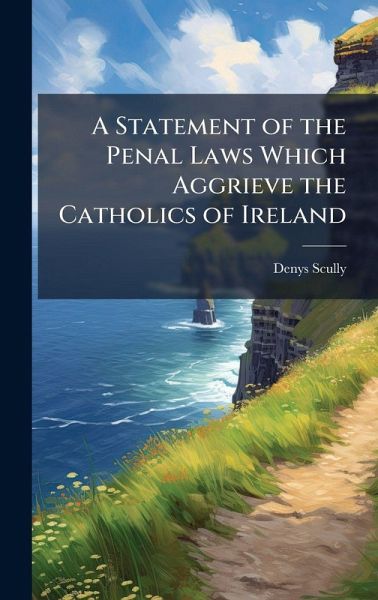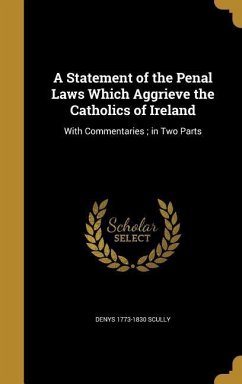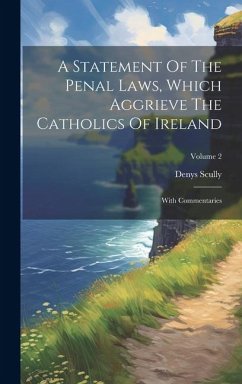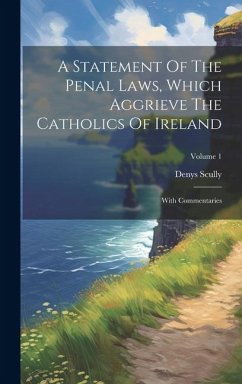
A Statement of the Penal Laws Which Aggrieve the Catholics of Ireland
Versandkostenfrei!
Versandfertig in über 4 Wochen
36,99 €
inkl. MwSt.
Weitere Ausgaben:

PAYBACK Punkte
18 °P sammeln!
"A Statement of the Penal Laws Which Aggrieve the Catholics of Ireland" by Denys Scully, originally published in 1812, is a significant historical document detailing the legal disabilities faced by Catholics in Ireland during the late 18th and early 19th centuries. This work provides a comprehensive examination of the penal laws, offering critical commentaries on their impact on Irish society. Scully's analysis covers a wide range of issues, including restrictions on property ownership, political participation, and religious practice, illustrating the systematic discrimination imposed upon Cat...
"A Statement of the Penal Laws Which Aggrieve the Catholics of Ireland" by Denys Scully, originally published in 1812, is a significant historical document detailing the legal disabilities faced by Catholics in Ireland during the late 18th and early 19th centuries. This work provides a comprehensive examination of the penal laws, offering critical commentaries on their impact on Irish society. Scully's analysis covers a wide range of issues, including restrictions on property ownership, political participation, and religious practice, illustrating the systematic discrimination imposed upon Catholics. This two-part study serves as an essential resource for understanding the historical context of Catholic emancipation and the broader struggle for civil rights in Ireland. It remains relevant for scholars and anyone interested in legal history, Irish history, and the dynamics of religious and political oppression. Scully's detailed exposition sheds light on the injustices of the era and the long road toward equality. This work has been selected by scholars as being culturally important, and is part of the knowledge base of civilization as we know it. This work was reproduced from the original artifact, and remains as true to the original work as possible. Therefore, you will see the original copyright references, library stamps (as most of these works have been housed in our most important libraries around the world), and other notations in the work. This work is in the public domain in the United States of America, and possibly other nations. Within the United States, you may freely copy and distribute this work, as no entity (individual or corporate) has a copyright on the body of the work. As a reproduction of a historical artifact, this work may contain missing or blurred pages, poor pictures, errant marks, etc. Scholars believe, and we concur, that this work is important enough to be preserved, reproduced, and made generally available to the public. We appreciate your support of the preservation process, and thank you for being an important part of keeping this knowledge alive and relevant.












